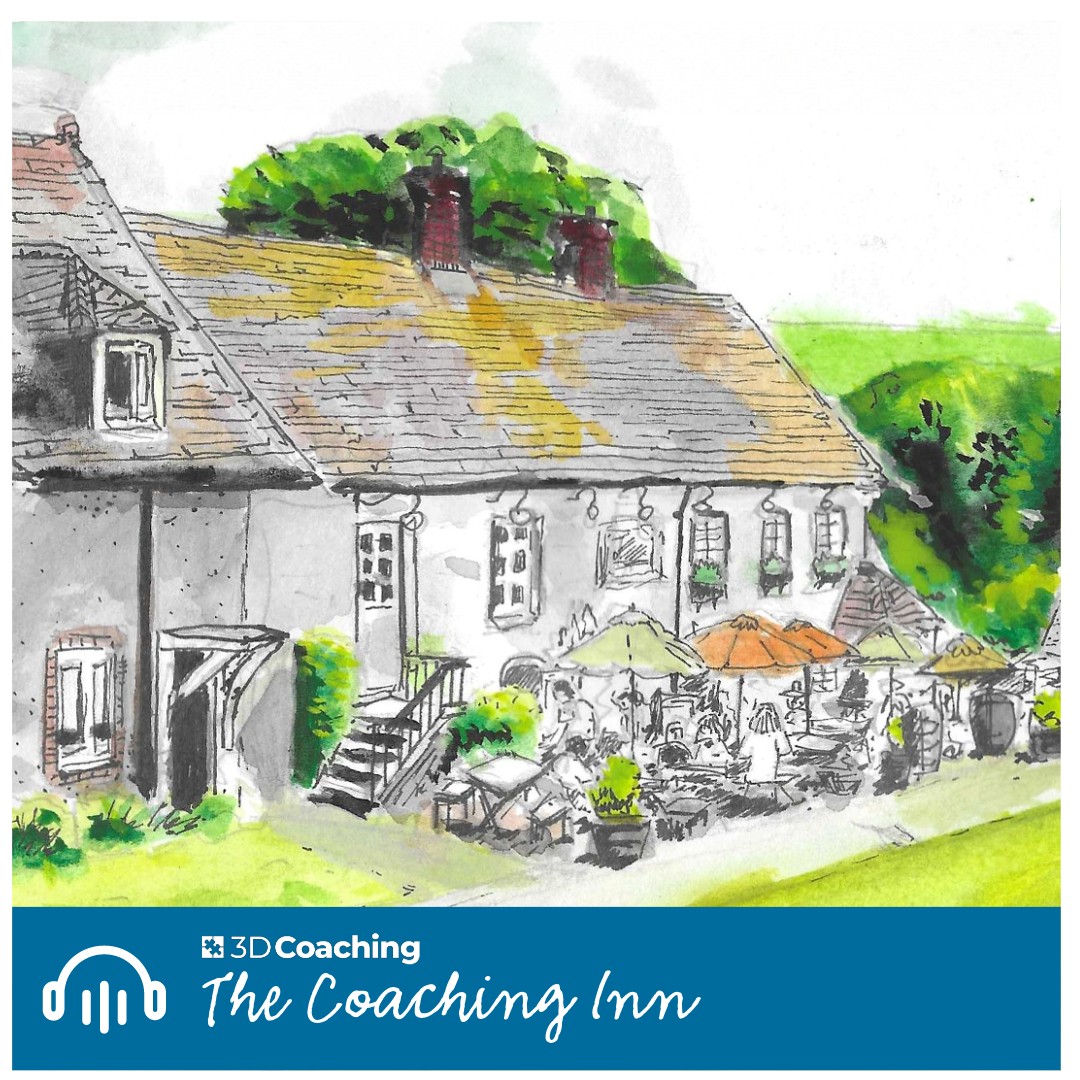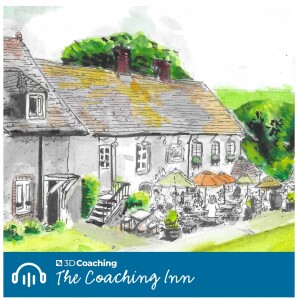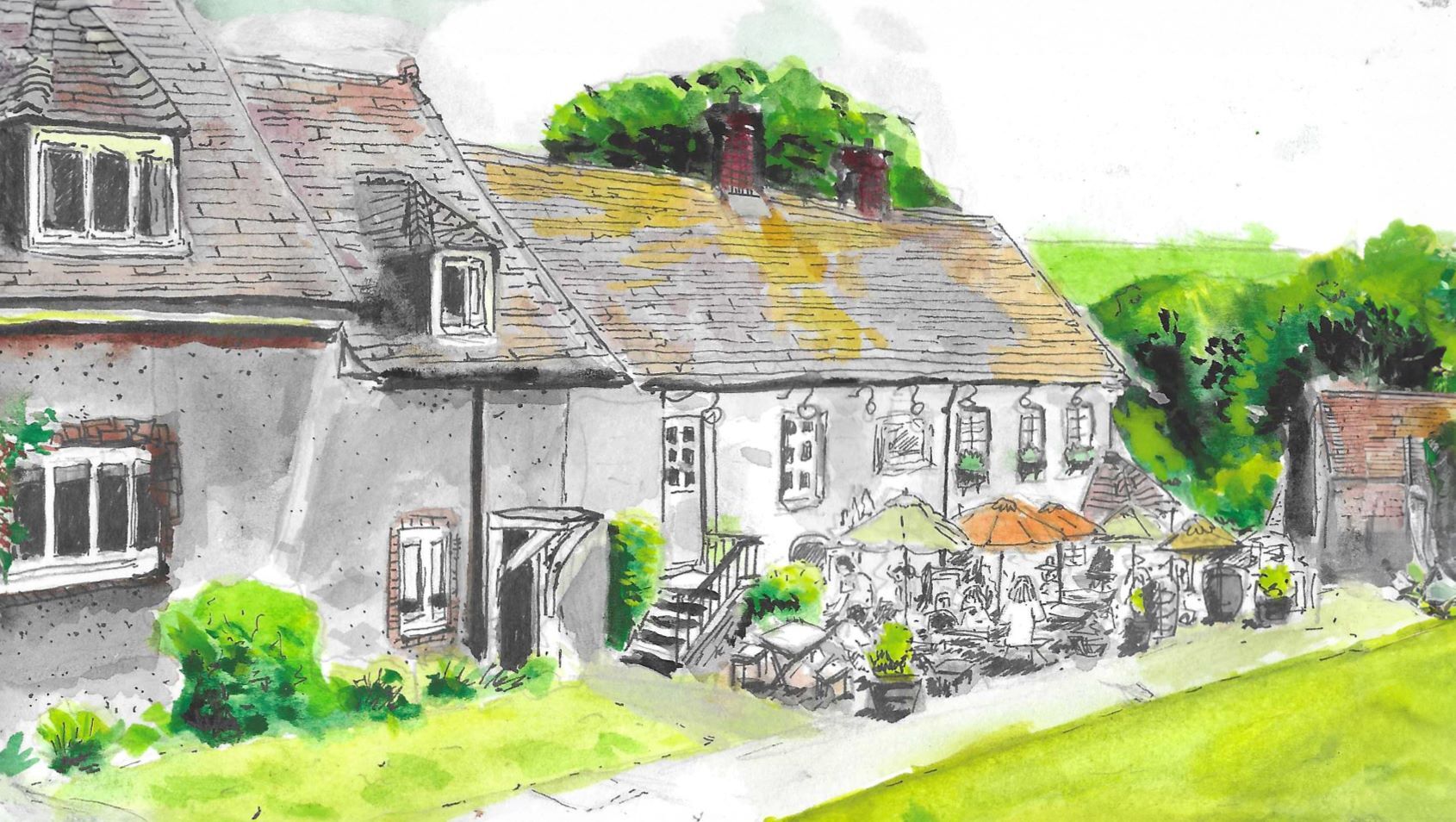
193K
Downloads
312
Episodes
Join Claire Pedrick MCC at 3D Coaching’s virtual pub where we have conversations with coaches, authors and thought leaders together with people new to coaching. It’s a cosy chat with a challenging edge. Become a regular by signing up on Apple Podcasts, Spotify or Podbean. Host: Claire Pedrick MCC
Episodes

Wednesday Apr 20, 2022
S2 Episode 13: Using Tools and Techniques in Coaching with Mike White
Wednesday Apr 20, 2022
Wednesday Apr 20, 2022
Today Claire Pedrick MCC is in conversation with Mike White PCC after they got into conversation on LinkedIn. Mike wrote a great post about tools, techniques and how to use them well whilst maintaining partnership. Mike is based in the UK and set up the Shropshire Coaches Group.
Here's the original LinkedIn post
Contact
Mike White PCC
Keywords
coaching, partnership, tools and techniques, leadership, professional development, coaching journey, client-centered coaching, ICF competencies, mentoring, coaching connections

Friday Apr 15, 2022
#3DBookGroup - Art of Enough - Chapter 5
Friday Apr 15, 2022
Friday Apr 15, 2022
Here’s Becky’s response to your questions and insights from Chapter 5
Next time it's Chapter 6 - Enough growth.
Ask your questions and share observations by commenting on this episode, or emailing info@3dcoaching.com
Keywords
coaching, recovery, reset, redesign, enough resources, burnout, leadership, organizational culture, pandemic, sustainable work

Wednesday Apr 13, 2022
S2 Episode 35: Act 3 How to Reimagine Your Life After 50 with Judy Reith
Wednesday Apr 13, 2022
Wednesday Apr 13, 2022
When Claire and Judy Reith first spoke about having a chat at The Coaching Inn about Judy and her husband Adrian's new book - Act 3: The Art of Growing Older, little did we know how important it was that they had written it while their ideas were evolving.
A key message from the book is to make choices about, and have a plan for, your Act 3 years before it is too late. Adrian’s untimely death has had a huge impact on Judy's own Act 3 as she faces a future she did not choose which is so far making her even more aware of making good life choices while she can. Some great life lessons here for coaches and every human especially anyone in Act 3.
Other books we mentioned are
I found my tribe by Ruth Fitzmaurice
4000 Weeks by Oliver Burkeman
Contact judy@act3life.com
Remember to subscribe or follow The Coaching Inn wherever you access your podcasts to get every new episode as they drop.
Keywords
coaching, life transitions, Act Three, attitude, purpose, values, key relationships, Goats Goals

Wednesday Apr 06, 2022
S2 Episode 11: Business Builder Open Table - Getting Your First 50 Coaching Hours
Wednesday Apr 06, 2022
Wednesday Apr 06, 2022
After our recent Business Special episode (highest listens of all time!), lots of people got in touch to ask for more! So we invited 5 coaches to join Claire at The Coaching Inn to talk about how they got their first 50 coaching hours. 'You have to put your hand up and say you're a coach'. Find out more as you listen and do share your ideas, insights and questions on social media.
Takeaways
- The first 50 hours of coaching are crucial for development.
- Pro bono work can help build confidence and skills.
- Transitioning to paid coaching requires courage and self-acceptance.
- Commitment from clients is essential for effective coaching.
- Reflective practice enhances learning during early coaching experiences.
- Building a referral network is important in the early stages.
- Coaching should feel fresh and new with each session.
- Understanding the value of coaching is key to charging for services.
- Fair exchange is a vital principle in coaching relationships.
- Every coaching journey is unique and personal. Self-employment requires a mindset shift from being an employee.
- Evaluate both paid and unpaid opportunities for growth.
- Liberation in learning is essential for new coaches.
- Practice and feedback are crucial in the early stages.
- Don't get overwhelmed by social media noise.
- Focus on your own coaching style and goals.
- Honour the first coaching hours as valuable learning experiences.
- Building relationships is key to establishing credibility.
- Coaching is not a solo journey; seek support.
- Enjoy the process and learn from every experience.
Thank you to (and contact details for):
Jamie Dru and
Keywords
coaching, first 50 hours, pro bono, paid coaching, coaching journey, client relationships, coaching ethics, coaching practice, coaching strategies, coaching insights, self-employment, coaching, mindset, learning, anxiety, niche, contracting, relationships, support, journey

Friday Apr 01, 2022
#3DBook Group - Art of Enough Chapter 4
Friday Apr 01, 2022
Friday Apr 01, 2022
Here’s Becky’s response to your questions and insights from Chapter 4
Next time it's Chapter 5 - Enough Resource.
Ask your questions and share observations by commenting on this episode, or emailing info@3dcoaching.com
Keywords
coaching, boundaries, personal development, organizational responsibility, wellbeing, resilience, work-life balance, digital habits, productivity, leadership

Wednesday Mar 30, 2022
S2 Episode 10: Internal vs External Coaching with J Val Hastings MCC
Wednesday Mar 30, 2022
Wednesday Mar 30, 2022
This week's guest is J Val Hastings coming back to The Coaching Inn for a second time. Val is the author of Coaching from the Inside. Claire and Val explore what's different about internal coaching - and using coaching in another role.
takeaways
- The trend is shifting towards internal coaching in organisations.
- Internal coaching requires a different set of competencies compared to external coaching.
- Coaching the system is essential for effective internal coaching.
- Clear role definitions are crucial for internal coaching success.
- Leadership must actively support and participate in coaching initiatives.
- Internal coaches often face unique challenges, including conflicts of interest.
- Supervision is vital for internal coaches to navigate their complex roles.
- Coaching should focus on awareness rather than just implementing change.
- The coaching process can be transformative but should not be overwhelming.
- Val Hastings' book offers practical insights for internal coaches.
Coaching from the Inside by J Val Hastings (OUP)
Contact Details: val@coaching4todaysleaders.com
Keywords
coaching, internal coaching, external coaching, coaching principles, coaching system, leadership, coaching challenges, coaching supervision, coaching ethics, coaching culture

Wednesday Mar 23, 2022
Wednesday Mar 23, 2022
In another business building episode, Claire Pedrick MCC meets Sarah Short from the Coaching Revolution - where Sarah generously shares some great ideas for aspiring and experienced coaches.
Free Community - Coaching Republic
Find out more about The Coaching Revolution where you can book a call with Sarah
You can buy a hard copy of Sarah's book A Coaching Business in a Book and/or download a free copy of the whole book here (thank you Sarah)
Takeaways
- The success of a coaching business depends on marketing skills as much as coaching skills.
- Niche marketing and ideal client profiles are essential for attracting clients who can and will pay a professional rate for coaching services.
- Coaches should focus on outcomes and the impact of coaching on clients' lives rather than the coaching process itself.
- Building a financially viable coaching business requires a strategic approach to marketing and visibility in the right places where potential clients are present.
Keywords
coaching, coaching revolution, financially viable coaching business, marketing skills, niche marketing, ideal client profiles, coaching process, outcomes, finding clients

Friday Mar 18, 2022
#3DBookGroup Art of Enough - Chapter 3
Friday Mar 18, 2022
Friday Mar 18, 2022
Here’s Becky’s response to your questions and insights from Chapter 3
Next time it's Chapter 4 - Enough Boundaries.
Ask your questions and share observations by commenting on this episode, or emailing info@3dcoaching.com
Keywords
coaching, presence, stress management, breathing techniques, personal development, emotional intelligence, mindfulness, resilience, body awareness, self-regulation

Wednesday Mar 16, 2022
S2 Episode 08: How do you use the Role Question in STOKeRS? (Open Table)
Wednesday Mar 16, 2022
Wednesday Mar 16, 2022
Today Claire is talking with coaches Mark Chappell, Fiona Craig, Caroline Drummond and Catherine Kramer who have all been asking questions about how you answer 'I don't know' questions when you're rightsizing the work at the beginning of every coaching conversation. Especially around the role question - how shall we do this? So we said come to The Coaching Inn and let's talk! We all learned something!
If you have a question about an aspect of coaching where you’d like to dig deeper, let’s talk at The Coaching Inn. Email us through info@3dcoaching.com Thinking about this together out loud will enable other coaches to learn and make their own meaning.
Contact:
- As a coach, it's important to ask the question 'How are we going to do this?' at the beginning of a coaching conversation to set the stage for exploration and partnership.
- It's okay for thinkers to say 'I don't know' in response to questions. It indicates that the work is in uncharted territory and allows for a more open and flexible conversation.
- The role of the coach is to create a safe space for the thinker to explore their thoughts and feelings without feeling pressured to have all the answers.
- Coaches should focus on what is of value to the coachee and be willing to let go of control and follow the thinker's agenda.
- The question 'How will you know we've moved this forward?' is a powerful tool for helping thinkers identify their desired outcomes and measure progress. Set clear expectations about coaching at the beginning of the coaching relationship to avoid mismatched expectations.
- Discuss and address cultural differences upfront when coaching across cultures.
- Avoid providing advice or tips unless specifically requested by the client.
- Regularly check in with clients to ensure the coaching process is on track and meeting their needs.
Keywords
coaching, 'I don't know' questions, right-sizing, role question, exploration, value, flexibility, coaching, expectations, coaching across cultures, clarity, checking in

Wednesday Mar 09, 2022
S2 Episode 07: Holding Space in Coaching with Fiona McBride
Wednesday Mar 09, 2022
Wednesday Mar 09, 2022
Today Claire Pedrick MCC is in conversation with Fiona McBride after reading a blog post that Fiona shared on Twitter about holding space - drawing on her experience as a coach, facilitator and yoga teacher. Listen as we explore presence and silence.
"In silence there is eloquence. Stop weaving and see how the pattern improves" Rumi
Takeaways
- Holding space is about being present with others.
- Presence is an essential skill in coaching.
- Facilitation requires self-awareness and connection.
- Yoga and coaching share similarities in holding space.
- Silence can be powerful in conversations.
- Making offers encourages dialogue and connection.
- People often need permission to slow down.
- Self-reflection is crucial for personal growth.
- Trusting the process is key in facilitation.
- Creating space for connection enhances learning.
Here's Fiona's blog on holding space and the one on crossover
Contact her: hello@fionamcbride.com
Keywords
coaching, holding space, presence, facilitation, yoga, silence, personal growth, connection, communication, mindfulness
